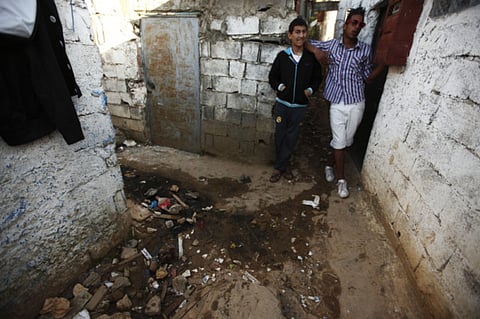North Africa jobless youth at 27.9 per cent
Gap between regime and youth grows in Algiers

Algiers: For Sid-Ali Boudra, 19 years old and jobless, this is Liberation Square: a tiny slice of concrete shaded by a few trees. Here at Petit Parc in central Algiers, he and his friends stretch their feet, play cards, smoke cheap cigarettes, and occasionally lose themselves in a haze of hashish or anise-flavoured liqueur until just before midnight, when they amble back to their cramped homes.
A few years ago, he dreamt of being a musician. But he gave up on that. Today he takes computer classes now and then and dreams of leaving Algeria for good. Like many of the young people in Algeria, the tall young man admits he has lost hope of finding a life here.
“There are no means,” he says. “We have no opportunities, and nobody cares about us.”
The kids of Cairo flooded Tahrir Square. The youth in Tunisia marched along the Avenue Borghuiba. Libyan teens with little more than stubble on their chins took up arms against one of the world’s most ruthless tyrants. Morocco’s king handed more power to an elected parliament after months of protests led by youth.
But their Algerian counterparts were, by comparison, a docile bunch. They did little to protest during last year’s Arab Spring. They declined to participate in May parliamentary elections billed as historic by the government of President Abdelaziz Bouteflika. Except for an elite sliver, they don’t make underground music or films like their counterparts in Morocco or Iran.
In the wake of the 2008 financial crisis, youth unemployment has reached disturbing levels across the globe, from southern European countries to South Africa and the US. In the Arab world, high levels of youth unemployment are not new, but recent revolutions have given many young people hope for change.
This makes the despair of Algerian youth - acknowledged even by stalwart supporters of the regime - more resonant, demonstrating how even oil wealth, zero debt and relative stability may not cure the maladies that sparked north Africa’s revolutions last year.
According to data compiled by the International Labour Organisation in 2008, Algerian rates for youth participation in the economy were about 28 per cent, compared to rates of above 40 per cent for Morocco, Syria and Turkey.
An ILO study released in May said unemployment rates for young people in north Africa had increased from 23.6 per cent to 27.9 per cent over the past year.
“Even if a young man does get a job he could be 30 or 40 and still be living with his parents because he can’t afford to get married,” says Hakim Saheb, a spokesperson for the RCD, an opposition political party. “Why are the young angry? Because Algeria is very rich and the population is very poor.”
Some blame the government for the problem. The gap between the elites in the regime and the country’s youth grows day by day. The population is 75 per cent young, but it is being led by clique of old war heroes aged over 70.
“There are no perspectives for the future, either economically or socially,” Mr Saheb said. “There are no doors open.”
The problems run deep, most of them rooted in the failings of a state that lost many of its elites after the end of French colonialism and suffered huge setbacks during its 1990s civil war against Islamists.
The troubles begin with an education system that emphasises rote learning, political ideology and religion over practical skill or even socialisation skills.
University degrees tend to feed graduates into a system where they will do little more than serve as bureaucratic functionaries. Outside work, there are few distractions, with no youth sports programmes and little by way of entertainment.
“Algeria is a laboratory of the future,” said Samir Tumi, the chief of a corporate headhunting firm. “It’s an example of a total rupture between a government and its young people. The people who are 20 years old are disillusioned by Islam. They are turned off by politics. The only thing for them to do is to go inside themselves and live day to day. They don’t believe.”
Few in the establishment - whether Islamists, socialists or liberals - have any credible ideas of how to surmount the country’s biggest challenge: smashing through the web of entrenched interests to create an economy that generates jobs leading to meaningful lives for the mass of young people.
Many complain of favouritism and nepotism when it comes to getting good jobs.
“If you don’t have any connections there’s no need to try to even find a job,” said Sihem Sahel, an unemployed 27-year-old with a journalism degree. “I send out emails, I take tests, I look at advertisements. Now, I’m fed up.”
The government launched a programme called “Ansej”, which gives small loans to young people to start businesses. By most accounts it has been a failure, with few paying the money back and little in the way of job creation. Some refuse to accept the money, arguing that it violates Islamic prohibitions on charging interest.
For its part, the ruling party offers no solutions to engage young people, beyond calling on them to celebrate the uprising against the French, though it is about to launch an ambitious five-year $268bn programme to rev up the economy.
“Algerian youth are more demanding and volcanic than other youth,” said Aissa Kassa, a spokesman for the party. “They’re living in an unrealistic word. You tell them about Algeria’s struggles with rural electrification. What does it mean to them? They’re growing up with internet, satellite, Facebook and Twitter.”
Back at Petit Parc, the young men play a new hand. “Serbi!,” they say - “Deal!” The games can go on all day.
Nearby in the park a group of elderly men play dominoes. Will Mr Boudra and his friends still be here in 30 years? “No way,” he insists. “We have ambitions.”



